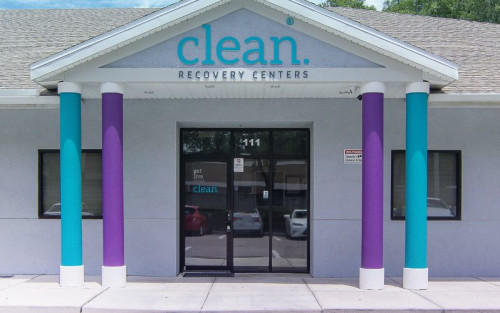
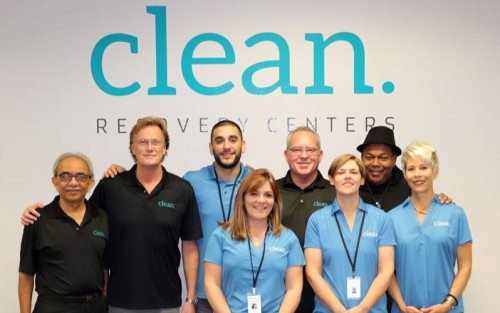
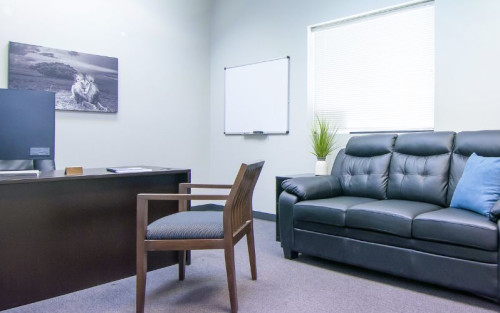



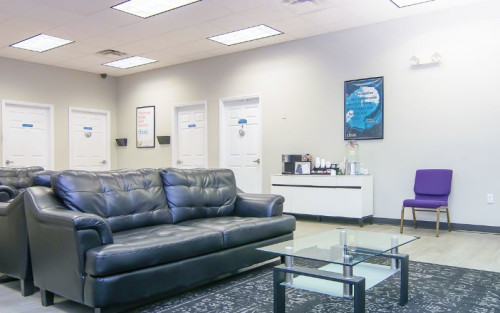
Clean Recovery Centers Tampa
Verified Center
This provider's information has been quality-checked by Recovery.com's Research Team for accuracy and completeness, including center verification through appropriate third-party organizations.
Treatment Focus
This center treats substance use disorders and co-occurring mental health conditions. Your treatment plan addresses each condition at once with personalized, compassionate care for comprehensive healing.
Primary Level of Care
Outpatient treatment offers flexible therapeutic and medical care without the need to stay overnight in a hospital or inpatient facility. Some centers offer intensive outpatient program (IOP), which falls between inpatient care and traditional outpatient service.
Treatment Focus
This center treats substance use disorders and co-occurring mental health conditions. Your treatment plan addresses each condition at once with personalized, compassionate care for comprehensive healing.
Primary Level of Care
Outpatient treatment offers flexible therapeutic and medical care without the need to stay overnight in a hospital or inpatient facility. Some centers offer intensive outpatient program (IOP), which falls between inpatient care and traditional outpatient service.
Provider's Policy
Payments for services at Clean Recovery Centers can be made through either private insurance, financing plans, or out-of-pocket, self-pay payments. Clean Recovery Centers accepts a wide variety of health insurance provider plans, including the providers listed below. Because insurance plan coverage can change frequently, and we are always adding new health insurers, we recommend calling Clean Recovery Centers to discuss insurance coverage, financial planning and payment arrangements for treatment.
Clean Recovery Centers Tampa
Clean Recovery Centers Tampa
About Clean Recovery Centers Tampa
Clean Recovery Centers Tampa provides multiple levels of care for addiction and mental health conditions. Their care levels include detox, residential addiction treatment, day/night treatment (DNT), intensive outpatient programs (IOP), and outpatient programs (OP). They use a 3-Phase care program to provide comprehensive, client-focused, and evidence-based recovery opportunities.
Recovery from Dual Diagnoses
Clean Recovery Centers Tampa is dually licensed to treat addiction and primary mental health conditions. They also treat co-occurring addiction and mental health conditions using a blend of evidence-based and holistic therapies. Masters-level therapists and psychiatric ARNPs (advanced registered nurse practitioners) lead 1:1 and group therapies, using cognitive behavioral therapy (CBT) and trauma-informed therapy to help clients heal at their roots.
3 Phases of Recovery
Clean Recovery Centers Tampa’s 3 phases of care include Preparation, Action, and Maintenance phases.
•In Preparation, clients undergo medically supervised detox, if needed. They’ll also complete residential treatment with 24/7 supervision, daily therapy, and a community of like-minded peers.
•In the Action phase, clients put what they learn into practice. This phase includes day/night treatment (with community housing), residential care for mental health concerns, and partial hospitalization for mental health.
• Finally, in the Maintenance phase, clients maintain their sobriety through IOP, OP, transitional living, and alumni support.
Primary Mental Health Treatment
In their Tampa location, Clean Recovery Centers offers mental health treatment in residential, IOP, partial hospitalization, and outpatient levels. In each phase, their mental health treatment uses 5 main components: trauma care, identity reconstruction, cognitive self-management techniques, personal growth strategies, and movement therapy. They use rapid resolution therapy (RRT) for trauma and other evidence-based therapies, like cognitive behavioral therapy (CBT), for grief and thought distortions.

Highlights from the Center
Highlights
These highlights are provided by and paid for by the center.
Joint Commission Accredited
Co-Occurring Disorders Treatment
Trauma-Informed Care
Master's Level Therapists
Center Overview
Treatment Focus
This center treats substance use disorders and co-occurring mental health conditions. Your treatment plan addresses each condition at once with personalized, compassionate care for comprehensive healing.
Joint Commission Accredited
The Joint Commission accreditation is a voluntary, objective process that evaluates and accredits healthcare organizations (like treatment centers) based on performance standards designed to improve quality and safety for patients. To be accredited means the treatment center has been found to meet the Commission's standards for quality and safety in patient care.
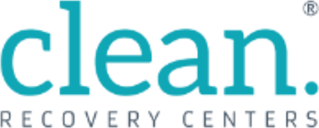
Insurance Accepted
Cash Pay Rates
Estimated Cash Pay Rate
Center pricing can vary based on program and length of stay. Contact the center for more information. Recovery.com strives for price transparency so you can make an informed decision.
Meet Your Care Team

Dr. Vijapura
Medical Director
MD
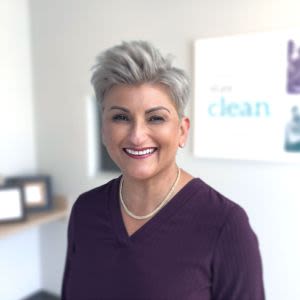
Veronica Zubia
Clinical Director
LMHC, MCAP
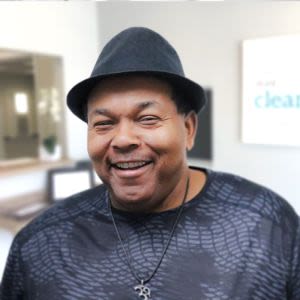
Charles Robinson
Clinical Supervisor
LMHC
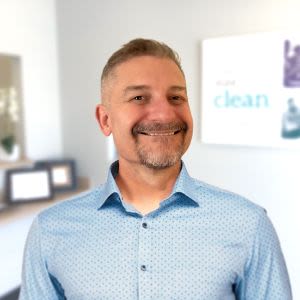
Victor Kovalev
Director of Nursing
MA, LMHC, RN, NCC
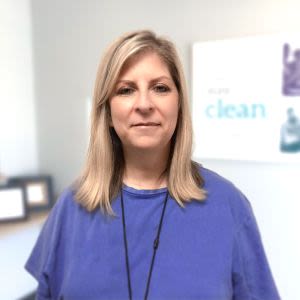
Kala Camper
NP – Tampa Recovery Center
APRN, PMHNP-BC

Shayne Sundholm
Executive Chairman, Co-Founder

Nick Cuneo
President, Co-Founder

Paul Tzatzimakis
Chief Executive Officer




Levels of Care







Your Care Options
Specializations
Alcohol
Using alcohol as a coping mechanism, or drinking excessively throughout the week, signals an alcohol use disorder.
Drug Addiction
Drug addiction is the excessive and repetitive use of substances, despite harmful consequences to a person's life, health, and relationships.
Prescription Drugs
It's possible to abuse any drug, even prescribed ones. If you crave a medication, or regularly take it more than directed, you may have an addiction.
Post Traumatic Stress Disorder
PTSD is a long-term mental health issue caused by a disturbing event or events. Symptoms include anxiety, dissociation, flashbacks, and intrusive thoughts.
Transitional Living
After rehab, some people stay in a transitional living situation before returning home. These programs offer structure, education, and community support.
Who We Treat
Men and Women
Men and women attend treatment for addiction in a co-ed setting, going to therapy groups together to share experiences, struggles, and successes.
Midlife Adults
For adults ages 40+, treatment shifts to focus on the unique challenges, blocks, and risk factors of their age group, and unites peers in a similar community.
Approaches
Evidence-Based
A combination of scientifically rooted therapies and treatments make up evidence-based care, defined by their measured and proven results.
Holistic
A non-medicinal, wellness-focused approach that aims to align the mind, body, and spirit for deep and lasting healing.
Twelve Step
Incorporating spirituality, community, and responsibility, 12-Step philosophies prioritize the guidance of a Higher Power and a continuation of 12-Step practices.
Wellness
Wellness philosophies focus on the physical, mental, and spiritual wellness of each patient, helping them restore purpose with natural remedies.
Therapies
1-on-1 Counseling
Patient and therapist meet 1-on-1 to work through difficult emotions and behavioral challenges in a personal, private setting.
Equine Therapy
Guided interactions with trained horses, their handler, and a therapist can help patients improve their self-esteem, trust, empathy, and social skills.
Massage Therapy
Massage therapy relieves physical and emotional tension, reduces pain, promotes relaxation, and improves emotion regulation.
Nutrition Counseling
Nutritious food helps patients heal from within, setting them up for mental and bodily wellness as they learn about healthy eating.
Relapse Prevention Counseling
Relapse prevention counselors teach patients to recognize the signs of relapse and reduce their risk.
Conditions We Treat
Anxiety
Anxiety is a common mental health condition that can include excessive worry, panic attacks, physical tension, and increased blood pressure.
Bipolar
This mental health condition is characterized by extreme mood swings between depression, mania, and remission.
Depression
Symptoms of depression may include fatigue, a sense of numbness, and loss of interest in activities. This condition can range from mild to severe.
Post Traumatic Stress Disorder
PTSD is a long-term mental health issue caused by a disturbing event or events. Symptoms include anxiety, dissociation, flashbacks, and intrusive thoughts.
Stress
Stress is a natural reaction to challenges, and it can even help you adapt. However, chronic stress can cause physical and mental health issues.
Trauma
Some traumatic events are so disturbing that they cause long-term mental health problems. Those ongoing issues can also be referred to as "trauma."
Substances We Treat
Alcohol
Using alcohol as a coping mechanism, or drinking excessively throughout the week, signals an alcohol use disorder.
Benzodiazepines
Benzodiazepines are prescribed to treat anxiety and sleep issues. They are highly habit forming, and their abuse can cause mood changes and poor judgement.
Co-Occurring Disorders
A person with multiple mental health diagnoses, such as addiction and depression, has co-occurring disorders also called dual diagnosis.
Cocaine
Cocaine is a stimulant with euphoric effects. Agitation, muscle ticks, psychosis, and heart issues are common symptoms of cocaine abuse.
Drug Addiction
Drug addiction is the excessive and repetitive use of substances, despite harmful consequences to a person's life, health, and relationships.
Ecstasy
Ecstasy is a stimulant that causes intense euphoria and heightened awareness. Abuse of this drug can trigger depression, insomnia, and memory problems.
Heroin
Heroin is a highly addictive and illegal opioid. It can cause insomnia, collapsed veins, heart issues, and additional mental health issues.
Psychedelics
Hallucinogenic drugs—like LSD—cause euphoria and increased sensory experiences. When abused, they can lead to depression and psychosis.
Languages
Aftercare
Care Designed for Your Needs
Amenities
Activities
Yoga
Yoga is both a physical and spiritual practice. It includes a flow of movement, breathing techniques, and meditation.






